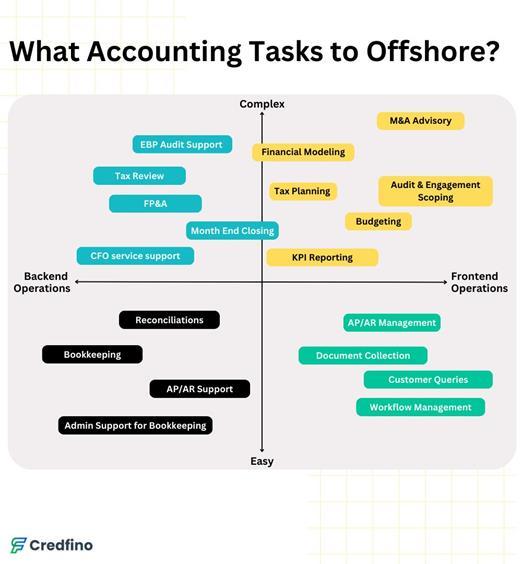
Why Tiered Pricing Strategy is a must for Accounting Firms (+Template Inside)
Tiered pricing gives accounting firms a flexible, confident way to price their services and raise fees without fear. Template included.

The accounting profession is facing a significant talent shortage, with a dwindling pool of skilled professionals entering the field. This crunch is being driven by an aging workforce and a lack of interest in new talent to enter the workforce and replace those nearing retirement age. In such a case, offshore accounting becomes a viable solution for businesses to fill the gap.
According to industry reports, 75% of the accounting workforce retired by 2020, leaving a substantial void in the workforce. This exodus of experienced professionals poses a major challenge for businesses that rely on accounting expertise for financial reporting, tax compliance, and strategic decision-making.
As a result, businesses are facing a shortage of qualified accounting professionals, which can lead to significant operational challenges, increased costs, and potential compliance risks.
Keeping the workforce shortage in mind, businesses have been employing offshore accounting services.
However, does offshoring accounting services make sense for your accounting firm? Let’s understand which working model fits your requirements.
Maintaining an in-house accounting team has proven to be a significant challenge for businesses, particularly in the face of the ongoing talent crunch within the accounting profession. High costs, limited resources, difficulties in scaling, and continuous training needs are just a few of the hurdles that organizations must navigate.
One of our clients, Robin, a bookkeeping firm owner, struggled with being stuck in an endless training loop with her onshore client. Keeping the client’s work moving became a constant challenge.
Check out her full testimonial here –
If you resonate with Robin’s journey, then offshoring bookkeeping services can be the solution for you. Schedule a call here to get started.
Salaries, benefits, office space, and technology infrastructure can quickly add up, making it an expensive endeavor, especially for smaller businesses or those operating on tight budgets.
On the other hand, onboarding an offshore accounting service can help you cut costs significantly.
Finding and retaining top accounting talent can be a daunting task, particularly in competitive job markets or specialized domains. This constraint can lead to gaps in knowledge and skills, potentially hindering the organization’s ability to handle complex accounting tasks or stay up-to-date with ever-changing regulations and best practices.
As a firm grows or experiences seasonal fluctuations in workload, adjusting the size of the team can be challenging. Hiring and training new employees is a time-consuming and costly process, while downsizing can lead to knowledge loss and disruptions in workflow.
The accounting profession is constantly evolving, with new regulations, technologies, and best practices emerging regularly. Providing ongoing training and professional development opportunities for in-house accounting staff is essential to ensure they remain up-to-date and proficient. However, this can be a substantial investment in terms of both time and financial resources.
Offshore accounting services offer a host of benefits for businesses seeking to streamline their financial operations and reduce costs. The primary benefits are listed below:
By outsourcing accounting tasks to countries with lower labor costs, companies can substantially reduce their overhead expenses. This cost arbitrage allows businesses to access high-quality accounting talent at a fraction of the cost of hiring locally.
Offshore accounting firms often employ accountants with diverse backgrounds and expertise, ensuring that businesses can find the right talent to meet their specific needs. This access to specialized knowledge and expertise can be particularly valuable for companies operating in niche industries or those with complex financial requirements.
As businesses grow or experience fluctuations in demand, they can easily scale their offshore accounting team up or down, providing flexibility and agility. This scalability allows companies to respond quickly to changing market conditions without the need to hire or lay off permanent staff.
Furthermore, by outsourcing non-core functions like accounting, businesses can focus their resources and energy on their core competencies and strategic initiatives. This increased focus can lead to improved operational efficiency, better decision-making, and ultimately, a competitive advantage in the marketplace.
What’s the perfect solution for your business? Should you hire an in-house team or onboard an offshore accounting partner?
A hybrid accounting model that combines the strengths of an in-house team and offshore accounting services can provide a comprehensive solution. This approach allows you to leverage the expertise of both teams, ensuring efficient and cost-effective operations while maintaining a strong client-facing presence.

The onshore team should consist of partners, managers, and senior-level teams responsible for strategic decision-making, client relationships, providing high-value services such as advisory or complex returns, and overall business management. These individuals possess a deep understanding of your company’s culture, values, and unique requirements, enabling them to provide personalized service and maintain strong client connections.
On the other hand, the offshore accounting team can handle the bulk of the accounting operations, including bookkeeping, financial reporting, tax preparation, and other routine tasks. By outsourcing these responsibilities to a skilled and experienced offshore team, you can access a pool of talented professionals at a lower cost, freeing up your in-house resources to focus on higher-value activities.
This hybrid model allows you to leverage the strengths of both teams, ensuring that your strategic and client-facing roles are handled by your onshore team, while the offshore team handles the operational accounting tasks efficiently and cost-effectively. By combining the expertise of both teams, you can achieve a comprehensive and well-rounded accounting solution tailored to your business needs.
Effective communication is critical when working with an offshore accounting team. Establish clear lines of communication and set expectations early on. Leverage video conferencing and collaboration tools to bridge the physical distance and foster a cohesive working relationship.
Implement robust performance tracking mechanisms to monitor the quality of work, adherence to deadlines, and overall productivity. Set measurable key performance indicators (KPIs) and regularly review progress to ensure seamless operations.
Cultural nuances can play a significant role in offshore collaborations. Educate yourself and your team about the cultural norms and business etiquette of your offshore partner’s location. Foster an environment of mutual respect and understanding to facilitate effective collaboration.
Data security should be a top priority when dealing with sensitive financial information. Ensure that your offshore accounting partner adheres to stringent data protection protocols and industry best practices. Implement secure file-sharing mechanisms, encryption techniques, and access controls to safeguard your company’s confidential data.
Regular training and knowledge-sharing sessions can help bridge skill gaps and ensure consistent quality across your hybrid accounting team. Encourage open communication and knowledge exchange to foster continuous learning and improvement.
On the talent front, the global accounting industry is facing a shortage of skilled professionals, particularly in developed economies. This scarcity is driving businesses to tap into the vast talent pool available in offshore locations, where highly qualified and experienced accountants can be accessed at competitive rates.
Offshore accounting hubs, such as India are actively investing in upskilling their workforce and nurturing specialized expertise to meet the growing demand.
Looking ahead, the offshore accounting industry is expected to undergo consolidation, with larger players acquiring smaller firms to expand their service offerings and geographic reach.
Moreover, the industry outlook points towards a shift from transactional accounting services to more strategic and advisory roles. Offshore accounting teams will increasingly leverage data analytics, business intelligence tools, and industry-specific knowledge to provide valuable insights and recommendations to their clients, cementing their position as trusted business partners.
Accounting firms that embrace this shift and strategically leverage offshore accounting services will gain a competitive edge, access to specialized expertise, and cost-effective solutions to support their growth and success.

Tiered pricing gives accounting firms a flexible, confident way to price their services and raise fees without fear. Template included.

Offshore accounting is here to stay. The question is how it is affecting the accounting industry. This is a debate that matters.

No accountant wants to train AI and ML models. Yet, AI in accounting can’t be ignored. Learn how to use accounting AI without being technical.